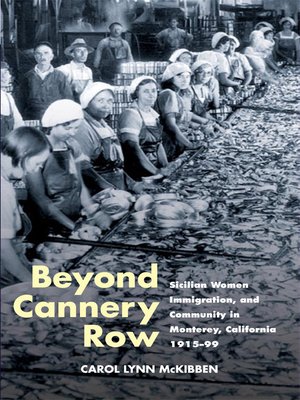Beyond Cannery Row
ebook ∣ Sicilian Women, Immigration, and Community in Monterey, California, 1915-99 · Statue of Liberty Ellis Island
By Carol Lynn McKibben

Sign up to save your library
With an OverDrive account, you can save your favorite libraries for at-a-glance information about availability. Find out more about OverDrive accounts.
Find this title in Libby, the library reading app by OverDrive.



Search for a digital library with this title
Title found at these libraries:
| Library Name | Distance |
|---|---|
| Loading... |
Presenting a nuanced story of women, migration, community, industry, and civic life at the turn of the twentieth century, Carol Lynn McKibben's Beyond Cannery Row analyzes the processes of migration and settlement of Sicilian fishers from three villages in Western Sicily to Monterey, California—and sometimes back again.
McKibben's analysis of gender and gender roles shows that it was the women in this community who had the insight, the power, and the purpose to respond and even prosper amid changing economic conditions. Vividly evoking the immigrants' everyday experiences through first-person accounts and detailed description, McKibben demonstrates that the cannery work done by Sicilian immigrant women was crucial in terms of the identity formation and community development. These changes allowed their families to survive the challenges of political conflicts over citizenship in World War II and intermarriage with outsiders throughout the migration experience. The women formed voluntary associations and celebrated festas that effectively linked them with each other and with their home villages in Sicily. Continuous migration created a strong sense of transnationalism among Sicilians in Monterey, which has enabled them to continue as a viable ethnic community today.
| Contents Acknowledgments Introduction 1. Sicilian Women, Fishing Lives, and Migration Strategies 2. Work and Identity 3. Family, Conflict, Community 4. Good Americans 5. Women on Parade: The Political Meaning of the Festa Conclusion Notes Bibliography Index |
"McKibben's integration of oral history with traditional documentary sources provides a chronology of Monterey's Sicilian community, while conveying the meaning of events and the import of the histories that her informants experienced... McKibben ably demonstrates the depth of the occupational and ethnic identity that the Sicilians created for themselves... A wonderful study that adds a complex and intimate glimpse at the highly gendered process of ethnic community building in the American West."—Journal of the West
"The greatest strength of Beyond Cannery Row is the rich body of interviews from which McKibben draws. She weaves these narratives into her text with great skill, and they make her arguments all the more persuasive... McKibben provides a welcome addition to the scholarship on gender and ethnicity in the West. Her compelling account of Monterey Sicilians' ethnic fishing identity - an identity that continues to this day - demonstrates the importance of gender, occupation, and place in community formation."—Western Historical Quarterly
|
McKibben's analysis of gender and gender roles shows that it was the women in this community who had the insight, the power, and the purpose to respond and even prosper amid changing economic conditions. Vividly evoking the immigrants' everyday experiences through first-person accounts and detailed description, McKibben demonstrates that the cannery work done by Sicilian immigrant women was crucial in terms of the identity formation and community development. These changes allowed their families to survive the challenges of political conflicts over citizenship in World War II and intermarriage with outsiders throughout the migration experience. The women formed voluntary associations and celebrated festas that effectively linked them with each other and with their home villages in Sicily. Continuous migration created a strong sense of transnationalism among Sicilians in Monterey, which has enabled them to continue as a viable ethnic community today.
| Contents Acknowledgments Introduction 1. Sicilian Women, Fishing Lives, and Migration Strategies 2. Work and Identity 3. Family, Conflict, Community 4. Good Americans 5. Women on Parade: The Political Meaning of the Festa Conclusion Notes Bibliography Index |
"Beyond Cannery Row is a significant contribution to the study and understanding of the processes of migration and settlement, and a compelling reminder of the crucial role of gender in shaping them."—Labour/Le Travail
"McKibben's integration of oral history with traditional documentary sources provides a chronology of Monterey's Sicilian community, while conveying the meaning of events and the import of the histories that her informants experienced... McKibben ably demonstrates the depth of the occupational and ethnic identity that the Sicilians created for themselves... A wonderful study that adds a complex and intimate glimpse at the highly gendered process of ethnic community building in the American West."—Journal of the West
"The greatest strength of Beyond Cannery Row is the rich body of interviews from which McKibben draws. She weaves these narratives into her text with great skill, and they make her arguments all the more persuasive... McKibben provides a welcome addition to the scholarship on gender and ethnicity in the West. Her compelling account of Monterey Sicilians' ethnic fishing identity - an identity that continues to this day - demonstrates the importance of gender, occupation, and place in community formation."—Western Historical Quarterly
|
Carol Lynn McKibben is a public historian and independent scholar in Monterey, California. She is currently the director of the Monterey Bay Regional Oral History and Immigration Project.







